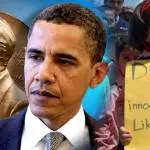Proximity Breeds Indifference
Written by Teodrose Fikre, March 13, 2017, 0 Comments
I’m going to share with you a frustration that once used to confound me the way that conjugating complete sentences used to flummox Sara Palin. About seven years ago, what seems like another lifetime, I started a website called Brown Condor. This website was dedicated to highlighting Ethiopian heritage and infusing it with the “African-American” culture. This was back then, when my sense of justice and equality was seen through a very limited prism—my focus was very much narrow targeted.
In starting this website, I wanted to use the gift that God gave me to write and express my narratives in ways that connects with the stories of others. I was convinced, before I wrote the first article, that browncondor.com (now defunct) would take off into the stratosphere the same way that Colonel John C. Robinson (the Brown Condor) once soared through Ethiopian skies. What I banked on was this one notion: I would have a base of support within the Ethiopian community and from there, as I highlighted the story of “my people” and marketed the venture of others, by derivative I would be successful too. I believed fully in hebret—the notion that two or more working together would accomplish more than one working apart—so I went about to build a media empire.
Alas my dreams were dashed amid the rock of Ethiopian indifference. I’m not writing this to malign Ethiopians for those who know me well understand that I cherish my place of birth in ways that is beyond words. But the truth is the truth, where the Ethiopian community once thrived through cooperation, too many of this era have inhaled the opiate of individualism and consumerism to the detriment of communal success. I preached for years that cooperation was better than competition; for some in the DMV “habesha” community, a penny today outweighed a dollar tomorrow.
Moreover, irrespective of my experience in business development and my acumen for marketing, I kept running into the brick wall of ego and pride as too many thought of themselves as experts who knew it all. So for seven years, I tried one venture after another—one event after another—to infuse into the community a sense of togetherness and collective advancement. I was stubborn for I was warned from the very beginning that I was wasting my time trying to make a difference in the habesha community. By the way, when I use the word habesha there is an intent to that because there sure is a difference between habesha people and Ethiopians. But I digress, let me circle back to the caution I was once given. “Teddy, you are better off using your talent outside of the community because people will not listen to you unless outsiders first accept you.”
These sage words which were relayed to me was disregarded because I too was infected with the virus of ego and pride and thought I could succeed where endless many failed before me. I spun my wheels over and over again and all I got for my efforts, irrespective of the hundreds of people I worked with and helped over the years, was mud that flung into my eyes from spinning tires. In time, my hope gave way to frustration as I would write an article about Ethiopian culture that told of our story in the most unique ways only to encounter silence and indifference from the masses. Though I captured a dedicated following with the Ethiopian community, my work never gained traction within the broader public. My resentment would be amplified by a factor of a hundred when an established “journalist” (read ferenj) would write a second rate story of Ethiopia with little originality and even lesser depth only to see that article going viral as a village of habesha people jumped on the bandwagon because an outsider wrote it.
Time would teach me that my frustration with “my people” is actually something that is not contained to just habesha people. This phenomenon of worshiping all things which are peddled by the establishment while disregarding the worth of “common folk” is as second nature as breathing and the love that I have for smell of kitfo (Ethiopian steak tartare). Too many of us conflate value with worth, as in we only see the worth of something when it is given value by the status quo or by the powerful. The same way price determines how we appraise the valuation of an object, we likewise valuate each other based not on inherent worth but based on external tariff.
Life is long for this reason I guess, we learn as we grow and in time life educates us—through kicks and through tears—to put away the things that imprisons us. For too long, my jail has been this one hope I had; that the small guy can bind with endless other small guys so that we can stop fighting over breadcrumbs and instead own the whole damn bread factory. Perhaps it’s in the way we are indoctrinated to only listen to authority or perhaps it’s an innate human behavior—one that was once useful probably—to bow before the powerful and follow those who have acquired fame and fortune. Whatever the cause, I realize now that it is human to follow the herd and rarely do we value those who act different.
I’ve been told endless times that I should write a book because what I write is something that many would read. People gave this advise to me within the context of me always writing on Facebook not too long ago and in the process devaluing my work because my words were being given away freely. This advice has merit, after all four years at Johns Hopkins earning an MBA drilled into my head the ways of demand and how it is created. But I rebelled for years against the thought of selling my work until a fling with lady indigence made my idealism bend to the gravity of reality’s mugging. So I wrote a book, two actually. The first one was Serendipity’s Trace followed up by Soul to Soil. Let me not sound like an ingrate for the truth is that I’ve sold more than a hundred copies and most of the people who bought the books were not even people I’ve ever met in my life.
Ah! But therein lies the rub. It is strangers who bought my books while the countless number of people who I know and the hundreds of people I’ve helped disregarded my work as if it was a bologna sandwich made out of mud cake. Too many in my own community are quick to buy shisha and coffee from Starbucks but will not lift a finger to support their own brethren when what I offer leads to knowledge while Johnny Walker Black Label only leads to death. What I write of my frustration though is not unique to me nor to the Ethiopian community I still cherish in my heart. Small business after small business is being suffocated as they lose customers to major corporations—instead of helping each other succeed we are slowly placing the noose around our economic viability.
I wrote earlier of the frauds Sean Hannity and Van Jones, about how the feign to care for us when in reality they are using our pains to advance their own interests. But in a way I almost don’t blame them at times, I am sure they too once struggled in anonymity trying to get their big breaks. What ultimately happens is that talent is “discovered” by someone famous the same way Christopher Columbus discovered America. A better word to use is uncover, as in someone famous uncovers the gifts of someone who is truly gifted and then tells their network about it. All the sudden, a town full of indifferent people break their necks as they do double-takes and rush to join the “me too” crowd to acknowledge the brilliance of someone they ignored for ages. Why then should those who suddenly become famous look out for the masses when the masses were steady ignoring their talent until their talent was accepted by the powerful?
I once had a conversation with a famous Ethiopian cinematographer who toiled for years in the same shadows as his talents were overlooked. He kept making one Ethiopian movie after another in ways that was heretofore never conceived. For his valiant efforts he received a collective indifference even though he resided and worked in the number one Ethiopian community in the world outside of Addis Ababa. Then he did something different and made a movie called “Sankofa“—a movie that told of a love between political prisoners (I refuse to reduce any human by calling him/her a slave). This person I write of is Haile Girma; all the sudden Ato Girma went from anonymous to famous and that is when his community started to knock at his door. The same people who ignored him while he was unknown all the sudden wanted to celebrate him once he became famous.
We have a way, I’m speaking of all of humanity not just my fellow Ethiopian-Americans, of ignoring something until that thing is valued by someone else. We do this with love as we take for granted our significant other until she leaves and hugs someone else only to realize her value once she exits stage left. This conniption of ours, to value the things we can’t have while disregarding the very things that are close to us, is magnified by factors when someone famous covets the very same thing we once disregarded. This is why someone was able to sell millions of pet rocks—as in a literally a rock that was freely available outside—because someone famous said “this is cool” so we said “me too!”
So I’ve learned to no longer get frustrated at these things and just learn to roll with the punches. I know that when my work is finally valued by the masses it will be only when someone famous accepts the work that you are reading at this moment. All the sudden, what was neglected will become coveted. But what I write will not be any different, to be honest some of my best writing was in the past when I used to post it freely on Facebook. Maybe one day we will learn to value things and especially people not based on price but on the inherent value. Until then, I and my fellow gifted sojourners, will keep putting our work to the public and will continue being thankful for the support that we get instead of being bitter for the support we have yet to garner.
The moral of the story can be summed up neatly this way: proximity breeds indifference. There was a bible verse I read a while back ago and the minute I read it I was struck by its depth. Yeshua (Jesus) said “Only in his hometown and in his own household is a prophet without honor.” This is so profound, for you see we have a way of worshiping pharisees (the rich and powerful) while disregarding honorable people who reside and work right among us. This is how the 1% are able to run roughshod over us, we keep confusing fame for knowledge and fortunes for benevolence. Things will change one day and we will begin to do better as a society when we stop coveting what the rich and powerful have and instead value the worth of the ones who actually live and struggle like us. #ProximityIndifference
Collaboration versus competition. Until we realize the value of the former and discount the latter, we will continue to suffer as a people. ~ Soul to Soil
The continuing bending toward’s the gravity of reality (click picture below to be redirected to Amazon profile)
Let me end this on a more somber note. This evening, while I was writing this article, I took a break and sauntered on Facebook. On my timeline I saw a post from Love Weah imploring her fellow Liberians to help out and contribute towards the funeral cost of Quincy Burrowes , a young man who left us too soon. It put things into proper perspective, I have no right to complain because I am still breathing and my pains don’t come close to the pains of Quincy’s family. So I’m doing my part to pass on the message and will ask those who can to help out someone who could have been our son or our brother even if we never met him. Rest in peace young soldier, may love embrace you for an eternity.
Dedicated to all who left us too soon, we try to understand why you left, occasionally we question God’s providence, why the road turns and leaves us alone we don’t know, but we are reminded in the end you are eternally in peace::
Teodrose Fikre
Teodrose was born in Ethiopia the same year Emperor Haile Selassie was deposed by the communist Derg junta. The grand-son of Emperor Atse Tewodros Kassa II, the greatest king of Ethiopia, Teodrose is clearly influenced by the history and his connection to Ethiopia. Through his experiences growing up as first generation refugee in America, Teodrose writes poignantly about the universal experiences of joys, pains and a hope for a better tomorrow that binds all of humanity.
Teodrose has written extensively about the intersection of politics, economic policies, identity, and history. He is the author of "Serendipity's Trace" and newly released "Soul to Soil", two works that inspect the ways we are dissected as a people and shows how we can overcome injustice through the inclusive vision of togetherness.
Latest posts by Teodrose Fikre (see all)
- Proximity Breeds Indifference - March 13, 2017
- VanHannity: Cutting Ears and Bleeding Humanity - March 13, 2017
- Elshadai: Give and Receive Kindness Like Abraham - March 12, 2017






